Do you often browse the internet check out your Facebook feed during work hours? New research conducted by the University of Texas, breaks down how idle time at work could hurt or help you and your company in the long run.
Researches at the McCombs School of Business at the University of Texas-Austin examined the cause and effect of idle time, and whether or not that downtime is harming work efficiency. In a national survey across a variety of occupational categories, McCombs Assistant Professor Andrew Brodsky and co-author Teresa Amabile of Harvard Business School found "78.1 percent of employees experience idle time at work, with 21.7 percent of employees experiencing idle time on a daily basis."
“We purposely exclude breaks, the times that employees have off, that they're allowed to relax,” Brodsky explained. “And we exclude procrastination where it's employees' choice not to be idle.”
The research also found that involuntary downtime where employees are unable to engage in their work tasks are often caused by numerous reasons -- often waiting for customers or not being assigned work by management.
The study estimates 7.4 billion hours of idle time are experienced by U.S. workers every year. Calculating this into the median U.S. wage of $17.09 per hour, roughly $100 billion is paid to employees for idle time.
In examining the consequences of downtime, McCombs and Amabile found that when workers expect downtime or idle time after they've completed a task, workers engage in work-stretching. This is defined as when the work pace declines and the task completion time increases. The opposite is found when workers are given a deadline, called "the deadline effect." That is when employees work slow in the beginning of a task and then speed up as the deadline approaches. The study also found this causes a deadtime effect, where workers steadily slow down during the completion of the task.
Researchers suggest that if an employee expects leisure time after a task is complete, then there is a chance for a decrease in actual idle time.
“They're actually more productive, they finish up their work more quickly, with just as high quality, and then they're available for anything unexpected that happens,” Brodsky explained. “So it's a bit of a twist when people say internet access is actually worse for productivity.”
In addition to this study, previous research suggests workers also don't want to be seen as idle or disengaged due to negative perceptions, even if is outside of the employee's control. This would slow down work progress to avoid being perceived as idle by managers.
"Increased transparency and understanding of the amount of time employees spend idle at work can help managers optimize worker productivity and satisfaction," Brodsky said.
TAP OR CLICK HERE to read the full study.

